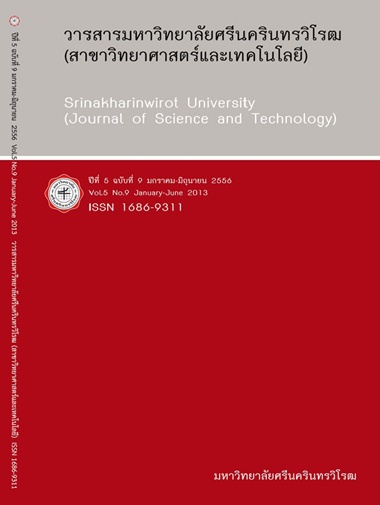ตัวเร่งปฏิกิริยาพอลิออกโซเมทาเลตที่แทนที่ด้วยเวเนเดียมสำหรับออกซิเดชันของไซโคลแอลเคนและแอลกอฮอล์ด้วยไฮโดรเจนเปอร์ออกไซด์ (VANADIUM (V)-SUBSTITUTED POLYOXOMETALATE CATALYST FOR OXIDATION OF CYCLOALKANES AND ALCOHOLS WITH HYDROGEN PEROXIDE)
Keywords:
Polyoxometalate, Vanadium, Oxidation, Alcohols, Cycloalkanes, Hydrogen peroxideAbstract
บทคัดย่อ
งานวิจัยนี้ได้สังเคราะห์และทำการพิสูจน์เอกลักษณ์ของเกลือเททราบิวทิลแอมโมเนียมของพอลิออกโซเมทาเลตชนิดเคกกิง แสดงผลของออกซิเดชันของไซโคลแอลเคนและแอลกอฮอล์ด้วยตัวเร่งปฏิกิริยาพอลิออกโซเมทาเลตที่ถูกแทนที่ด้วยวาเนเดียม [(n-C4H9)4N)]4[PW11VO40] และไม่ได้ถูกแทนที่ [(n-C4H9)4N]3[PW12O40] โดยใช้ไฮโดรเจนเปอร์ออกไซด์เป็นสารออกซิไดซ์ สำหรับออกซิเดชันที่เร่งปฏิกิริยาระบบเอกพันธ์ของไซโคลเฮกเซนและไซโคลออกเทน พบว่าตัวเร่งปฏิกิริยาชนิดที่ถูกแทนที่ด้วยวาเนเดียมมีประสิทธิภาพสูงกว่าภายใต้ภาวะปฏิกิริยาเดียวกัน ทั้งนี้เนื่องจากความสามารถในการรีดิวซ์ของวาเนเดียม ตัวเร่งปฏิกิริยาทั้งสองชนิดให้ความเลือกจำเพาะต่อคีโทนสูงกว่าแอลกอฮอล์ และเกิดไซโคลแอลคิลไฮโดรเปอร์ออกไซด์ขึ้นด้วย ภายใต้ภาวะปฏิกิริยา: สารตั้งต้น 23 มิลลิโมล ตัวเร่งปฏิกิริยา 0.05 มิลลิโมล สัดส่วนโดยโมล H2O2/สารตั้งต้น = 3 CH3CN 5 มิลลิลิตร อุณหภูมิของปฏิกิริยา 70 องศาเซลเซียส เวลา 8 ชั่วโมง ตัวเร่งปฏิกิริยา[(n-C4H9)4N]4[PW11VO40] ให้ผลการเปลี่ยนรูปของไซโคลเฮกเซน และไซโคลออกเทน 63% และ 70% โดยมีความเลือกจำเพาะต่อคีโทน 52% และ 50% ตามลำดับ สำหรับออกซิเดชันของแอลกอฮอล์ด้วยตัวเร่งปฏิกิริยา [(n-C4H9)4N]4[PW11VO40] ได้ทำปฏิกิริยาโดยไม่มีตัวทำละลายใดๆ เติมลงไป เป็นระบบสองวัฏภาค (น้ำ-แอลกอฮอล์) พบว่าไซโคลเฮกซานอลถูกออกซิไดซ์เป็นไซโคลเฮกซาโนน โดยมีค่าการเปลี่ยนรูป 92% ความเลือกจำเพาะ 100% ในขณะที่เบนซิลแอลกอฮอล์ถูกออกซิไดซ์เป็นเบนซัลดีไฮด์ โดยมีค่าการเปลี่ยนรูป 88% ความเลือกจำเพาะ 100% ภายใต้ภาวะปฏิกิริยา: สารตั้งต้น 23 มิลลิโมล ตัวเร่งปฏิกิริยา 0.05 มิลลิโมล สัดส่วนโดยโมล H2O2/สารตั้งต้น = 2 อุณหภูมิของปฏิกิริยา 90 องศาเซลเซียส เวลา 3 ชั่วโมง กลไกของปฏิกิริยาเกิดผ่านแรดิเคิล สามารถนำตัวเร่งปฏิกิริยามาใช้ซ้ำได้ 3 ครั้งโดยมีประสิทธิภาพลดลงเพียงเล็กน้อย
Abstract
In this research the tetrabutylammonium salts of the Keggin-type polyoxometalates were synthesized and characterized. The results on oxidation of cycloalkanes and alcohols over vanadium(V)-substituted polyoxometalate catalyst, [(n-C4H9)4N)]4[PW11VO40] and unsubstituted polyoxometalate catalyst, [(n-C4H9)4N]3[PW12O40] with hydrogen peroxide as an oxidant are presented. For the homogeneously catalyzed oxidation of cyclohexane and cyclooctane, the vanadium(V)-substituted catalyst is found to be more active under the same reaction condition. This is due to reducibility of vanadium. Both catalysts gave higher selectivity to ketone than alcohol. Cycloalkyl hydroperoxide was also formed. Under reaction conditions of: substrate 23 mmol, catalyst 0.05 mmol, H2O2/substrate molar ratio = 3, CH3CN 5 ml, reaction temperature 70๐C, time 8 h, the [(n-C4H9)4N]4[PW11VO40] yielded 63% and 70% conversion with 52% and 50% selectivity to ketone, respectively for oxidation of cyclohexane and cyclooctane. For the oxidation of alcohols, the reactions were performed over the [(n-C4H9)4N]4[PW11VO40] in the absence of any added solvent, as a two-phase system (aqueous-alcohol). Cyclohexanol was oxidized to cyclohexanone with 92% conversion and 100% selectivity whereas benzyl alcohol was oxidized to benzaldehyde with 88% conversion and 100% selectivity under the reaction conditions of: substrate 23 mmol, catalyst 0.05 mmol, H2O2/substrate molar ratio = 2, reaction temperature 90๐C and time 3 h. Reaction mechanism is shown to occur via radical pathway. The catalysts can be reused 3 times with slight decrease in activity.
Downloads
Downloads
Published
How to Cite
Issue
Section
License
Srinakharinwirot University Journal of Sciences and Technology is licensed Under a Creative Commons Attribution-NonCommercial-NoDerivs 4.0 International (CC-BY-NC-ND 4.0) License, Unless Otherwise Stated. Please Read Journal Policies Page for More Information on Open Access, Copyright and Permissions.



